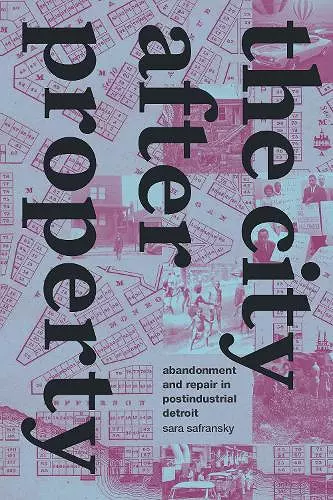The City after Property
Abandonment and Repair in Postindustrial Detroit
Format:Hardback
Publisher:Duke University Press
Published:15th Aug '23
Currently unavailable, and unfortunately no date known when it will be back
This hardback is available in another edition too:
- Paperback£22.99(9781478020783)

In The City after Property, Sara Safransky examines how postindustrial decline generates new forms of urban land politics. In the 2010s, Detroit government officials classified a staggering 150,000 lots—more than a third of the city—as “vacant” or “abandoned.” Analyzing subsequent efforts to shrink the Motor City’s footprint and budget, Safransky presents a new way of conceptualizing urban abandonment. She challenges popular myths that cast Detroit as empty along with narratives that reduce its historical decline to capital and white flight. In connecting contemporary debates over neoliberal urbanism to Cold War histories and the lasting political legacies of global movements for decolonization and Black liberation, she foregrounds how the making of—and challenges to—modern property regimes have shaped urban policy and politics. Drawing on critical geographical theory and community-based ethnography, Safransky shows how private property functions as a racialized construct, an ideology, and a moral force that shapes selves and worlds. By thinking the city “after property,” Safransky illuminates alternative ways of imagining and organizing urban life.
“By asking ‘What comes after property?’ Sara Safransky opens up a captivating and incisive mix of political economy and urban geography to think with and against dominant discourses on Detroit’s decline. The result is a refreshing take on the entanglements of property, race, and urban politics that adeptly weaves ethnographic and archival research with political theory and global struggles for freedom into a rich analysis that makes The City after Property essential reading for scholars of racial capitalism and urban change.” -- Kate Derickson, Associate Professor of Geography, University of Minnesota
“With lucid storytelling, flowing prose, and rich historical contextualization of a city that has been, contradictorily, both ignored and over-analyzed, Sara Safransky has produced a text that is a must-read.” -- Rachel Brahinsky * Urban Geography *
"In The City after Property, Safransky masterfully weaves rich stories, her own experiences doing field research, and data together to show the devastating impact of planning decisions in the City of Detroit. . . . The City after Property teaches us to trust Black and Brown people as they lead the way in stewarding land, defining collective ownership, and redesigning cities – after property." -- tamika l. butler * Urban Geography *
"A magisterial work of urban geography. The book is a fluid and remarkable conversation between the concrete and the abstract, between the empirical and the theoretical, between the streets of Detroit and debates in the critical social sciences. Abstractions such as racial capitalism, property regimes, and sustainability fixes, among others, are grounded through thick description and rich ethnographic detail, drawn from interviews and archives." -- Nathan McClintock * Urban Geography *
"The City After Property... is a thoughtful, powerful, and respectful examination of Detroit, its history and people, and the everyday land and property struggles embedded in the reimagining of a city. Safransky shines a light on well-worn popular narratives of Detroit’s recent history, including debates ranging from vacancy and evictions to utopian visions of postindustrial agrarian urbanism, to expose the complexities, challenges, and lived realities of modern-day Detroit." -- Rachel Barber & Maxwell Hartt * Journal of Urban Affairs *
"In the academic literature, a well-crafted book is more than words on paper; it becomes a guiding light, illuminating solutions to specific challenges and opening new avenues of thought. The City After Property does no less: it offers a comprehensive exploration of land and property issues in Detroit, providing valuable insights into the city’s urban planning and development landscape in the early 2010s." -- Micaela Mancini * Dialogues in Urban Research *
“The City after Property is at once an intimate ethnography of the city, a geographic critique of racial capitalism, and a celebration of the visionary work of Detroiters fighting to remain in the city in the context of massive displacement. One of the feats of this book is the fluid narration of the structural to the intimate. This means that as it describes the roots of tax policy it always returns to the lived experience of it, the human, the intimate, loss and grief. The result is Safransky’s own refusal, over and over, to reduce the forces of dispossession in Detroit to abstraction.” -- Jessi Quizar * Antipode *
ISBN: 9781478020028
Dimensions: unknown
Weight: 590g
328 pages